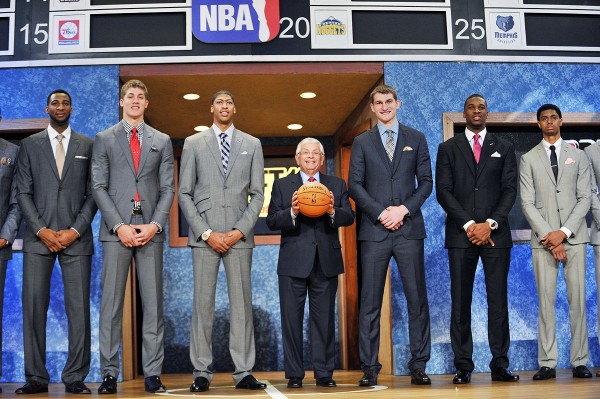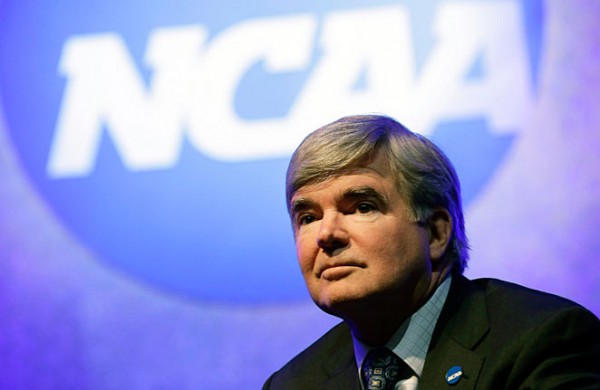On the Injustice That Is the Way-Too-Soon NBA Draft Deadline
Posted by Chris Johnson on April 15th, 2013Chris Johnson is an RTC Columnist. He can be reached @ChrisDJohnsonn.
Just last week, Louisville and Michigan were playing one of the most entertaining NCAA Tournament championship games in years. Luke Hancock was scorching threes, Kevin Ware was blissfully crutching his way around a confetti-drenched Georgia Dome, and Spike Albrecht was tweeting at Kate Upton. College basketball was just wrapping up another fantastic season. And now, just a week after the final game of the year, some of the nation’s top players have an utterly crucial decision to make: Stay in school or declare for the NBA Draft?

Players deserve more time to conduct research and solicit outside opinions on this pivotal decision (AP Photo).
Decisions like this – decisions that could have lasting implications on a player’s earning power and academic and professional futures – are not trivial matters to be pushed aside. Other than maybe choosing a college, deciding when to leave college and pursue one’s athletic dreams at the professional level is probably the biggest decision any of these kids have ever made. It requires calculated reasoning and a thorough investigation of the potential costs and benefits. This isn’t the case for everyone; some guys have it easy. For Shabazz Muhammad, leaving UCLA after one season will go down as one of the least surprising one-and-done jumps of all-time. Others face competing interests, unwavering loyalties and strong ties to teammates and coaches. Some just love being in college, particularly at “basketball schools” where the hardwood practitioners are afforded demi-god levels of celebrity. What’s so bad about unrivaled popularity and social stature, anyway?
The real process is a lot more complicated than that. Financial hardship often forces players to leave school earlier than they otherwise would have. A hot shooting streak during the NCAA Tournament sends them flying up draft boards, rapidly and prominently enough that not entering the draft could leave a prospect regretting a major missed opportunity after the fact.
Point is, there are a bunch of things that go into any player’s draft decision, and all of it must be meshed together, sorted out and finalized in just eight days (you read that correctly — eight!). Even if players don’t officially declare for the draft and instead simply consult the undergraduate advisory committee for an independent assessment on potential draft placement, failing to withdraw from the process can result in a loss of his eligibility. What’s worse, if a player decides to make the professional leap and then goes undrafted, his options are essentially reduced to one of three avenues: 1) Europe; 2) the NBA D-League; 3) devastating regret over mistakenly leaving school and pursuing a professional career.
This early decision date – April 16, or tomorrow, to be exact – came about as a response to ACC coaches’ demands for more clarity and frankness in their spring recruiting endeavors. Without knowing exactly who was staying and coming back, coaches were often forced to persuade players without knowing the exact details of scholarship availabilities and roster spots. Do you sign a new recruit under the assumption your 20 PPG hyper-athletic scoring wing will take his talents to the professional ranks? Urge haste in that player’s stay-or-go decision process? Tell them that you just don’t know?
You can see why coaches would be up in arms about something like this, but it’s no consolation to the enormous weight and accelerated pressure players now face with the draft deadline pushed up earlier than ever before. Coaches would like their recruiting cycles to be all neat and tidy, and in a utopian world with boundless scholarship allotments and no NBA age limit and greater clairvoyance between NBA front office types and college players, the onerous timetable of cramming NBA departures and pivotal prospect signings into a compact window wouldn’t exist. Players would leave at their own leisure, coaches would lock up new players not having to worry about scholarship crunches, and the whole process would allow for a more equitable and well-informed cycle.

The early decision date is yet another instance of the NCAA putting the well-being of players on the back burner. (AP Photo)
In other words, players and coaches would get their way. There would be no rushed decisions, no hurriedly-conceived emotional reactions. The current timetable helps out one of those two groups, the coaches, because when has the NCAA ever gone out of its way to support the financial well-being of its student athletes – its uncompensated, money-generating, hypocritically-termed-amateurish drones – ahead of its filthy rich coaches and university presidents?
This is only like, oh I don’t know, the most important decision any of these players will ever have to make. Coaches have an entire offseason to weigh different offers and solicit interviews with various programs. NCAA enforcement staffers spend months ironing out arcane enforcement scruples and obscure regulations. Players get eight days and bare-minimum information before having to reach a consensus about whether to throw themselves to the hazardous caprices of NBA general managers in the most exclusive talent selection process in professional sports and leave behind friendships and teammates and a great education and everything else that goes along with being a high-profile Division I college basketball player on a college campus.
That’s fair as much as Mark Emmert is respected as a sovereign presence atop the NCAA’s leadership structure; which is to say, very little. There may be no greater bottom-line statement on the NCAA’s misaligned priorities.












































